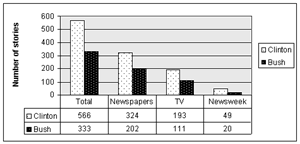The most striking single statistic is the drop in the amount of coverage of Bush versus Clinton in their early days.
The drop-off is across the board—across TV, newspapers and newsweeklies. Network television was down 43%, newspapers 38%.

Newsweek magazine alone had 59% fewer stories about Bush in its pages than it carried about Clinton eight years earlier, just 20 stories in the eight issues from the beginning of February to the beginning of April, compared with 49 stories about the new president in the first eight issues in 1993.
Only one news organization stood out for its consistency. The News Hour with Jim Lehrer actually showed a slight increase in coverage of Bush over Clinton in their first two months in office.
While some analysts have suggested that this may be a function of Bush shrewdly keeping a lower profile2, it also may reflect in part changes in the nature of the media culture. The selection of stories in the media is now often lighter, with a movement away from politics, other studies have found. One sign of this is that, in looking at the total number of stories, the president is still a dominant figure on op-ed and editorial pages, but dominates stories on the front pages, newscasts and financial pages less often.
Some, including the president's press secretary, have suggested that this will serve the president well, since people will appreciate his decision not to exploit situations such as the return of the American military personnel from China.3
But if he is pushing an agenda on taxes or clean air that does not have broad support, this lower profile may also make it harder to quickly rally citizen support when he needs it.
While the drop off in coverage was general, within newspapers it was clearly more pronounced in some areas more than others. In particular, there was a big decline in the amount of coverage on the front of the financial sections (from forty-three stories about Clinton to just five about Bush).
Whether by design or accident, Clinton was attached in news pages to the economic downturn of 1993. That may have been because Clinton, as a Democrat who had campaigned on the economy, felt a need to carry through with the promise that he would be more responsive to economic changes than his predecessor.
Regardless, it did not do him much good, as Clinton earned little credit for the economic turnaround that occurred in 1994 and Democrats suffered in the Republican landslide of November that year. Bush, by contrast, offered some early comments on the economy, but now seems to have pulled back from doing so. One possible reason, along with the fact that Bush has broader support in the business world, is that economic news has changed somewhat in eight years, becoming more about companies and the stock market and somewhat less tied to federal economic indices.
Even editorial writers at the Washington Post and New York Times write less about Bush than they did about Clinton. The two papers wrote 74 editorials about Clinton, versus just 46 about Bush, in the sample studied.
The one area where there was no drop off in coverage was among columnists and op-ed writers. The Times and Post wrote 60 about Clinton, and 62 about Bush. If newspapers and television are covering the presidency less, columnists and guest columnists are just as focused on the White House as they once were.
2 Michael Kelly, "The Quiet Man," Washington Post, April 18, 2001
3 John Harris, "Leading Actor Bush Avoids Center Stage," Washington Post, April 14, 2001.


